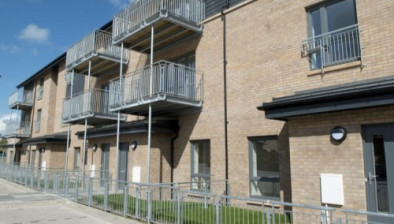Campaigners call on housing associations to prevent tenants from smoking at home
 Anti-tobacco charity ASH Scotland is seeking talks with social housing providers in a bid to prevent some tenants from smoking at home.
Anti-tobacco charity ASH Scotland is seeking talks with social housing providers in a bid to prevent some tenants from smoking at home.
Chief executive Sheila Duffy believes more can be done to improve protections for those living in homes with shared spaces, particularly children.
The charity wants to meet the Scottish Federation of Housing Associations (SFHA) to explore ways of allowing social housing tenants to have the choice of smoking or non-smoking accommodation.
It also wants to look at how legislation surrounding smoking in residential care homes could be tightened up to protect staff from breathing in second-hand smoke.
Ms Duffy said: “We know second hand smoke is a toxic substance and many people are experiencing smoke drift into where they are living. We would like to see a choice of smoke-free social housing.”
The move could lead to entire buildings, stairwells and communal garden areas becoming smoke-free zones, with tenants at risk of breaching agreements if they allow smokers to light up.
Ms Duffy added: “We would like people to have the choice to live in smoke free accommodation. At the moment there’s not an option.”
The move has been boosted by a call from Aberdeen University’s Dr Sean Semple for a national debate around smoking at home.
Last week the academic said: “We need to have a debate on why we currently think it acceptable to expose non-smokers, including children, to secondhand tobacco smoke within indoor spaces. That debate needs to include smoking in the home.”
Dr Semple, who is director of the Scottish Centre for Indoor Air and a senior lecturer in the Respiratory Group at Aberdeen University, said while soft measures including television campaigns could help make smoking at home socially unacceptable, a law or restrictions similar to those that prohibit smoking in cars when children are on board, could be considered.
“As a society, we still consider that legislation to protect children in their own home from this known hazard, this known carcinogen, would be a step too far and would infringe smokers’ rights.
“We need to look at ways to help smokers quit or, if that isn’t possible, to make sure they only smoke outside.”
“Why is it that in Scotland in 2017, a worker in a bar has had legal protection from being exposed to second-hand smoke for over a decade but a child in their own home has no equivalent protection from the same substance — and often at higher concentrations than we measured in bars in 2006?”
Earlier this year Professor John Middleton, president of the Faculty of Public Health, called for a ban on smoking in new council houses to protect children from harmful second-hand smoke.
Under his proposals, tenants would be required to sign an agreement not to smoke in new local authority or housing association homes.
ASH Scotland’s call was dismissed by smokers’ group Forest whose director Simon Clark said: “Banning smoking in any home would be a gross invasion of people’s privacy. Targeting social housing is particularly obnoxious because it penalises unfairly those who can’t afford to buy their own home.”









